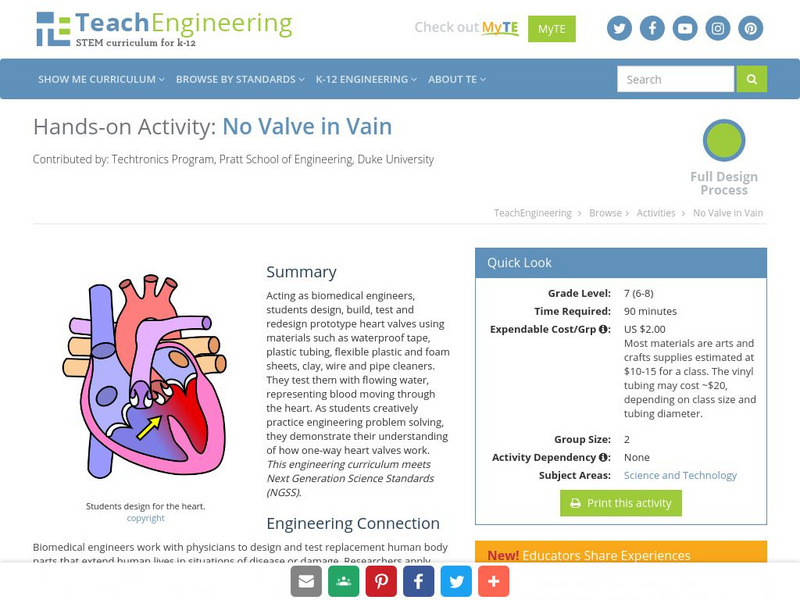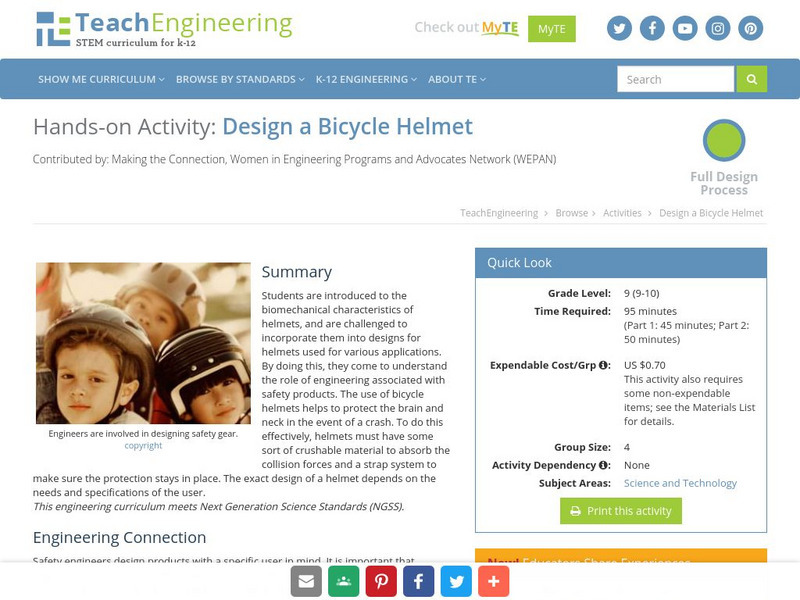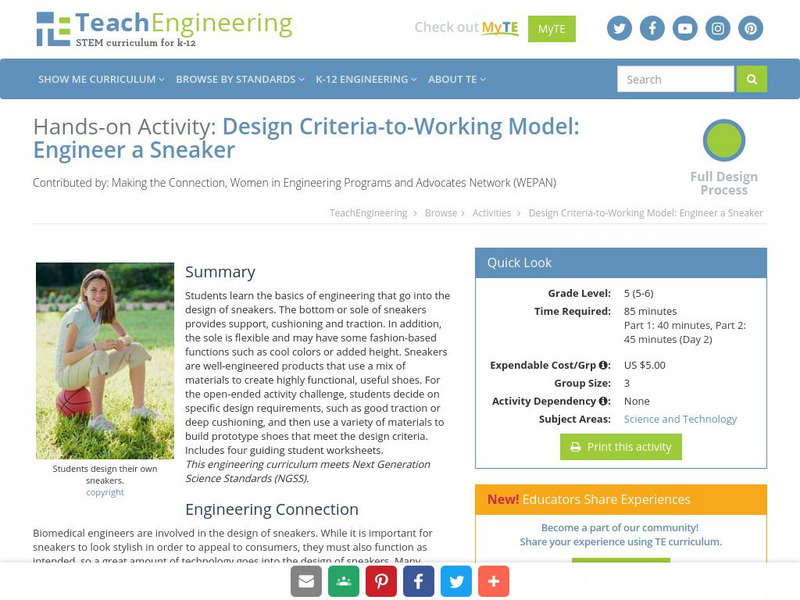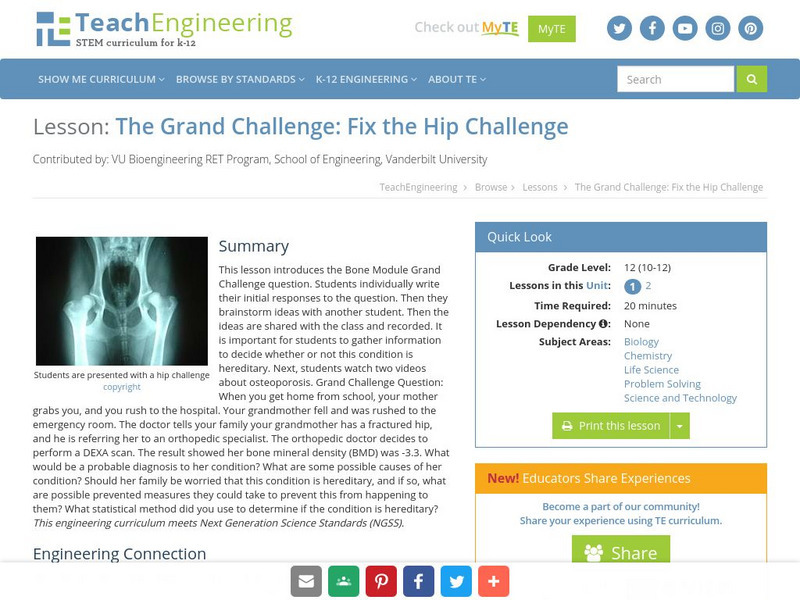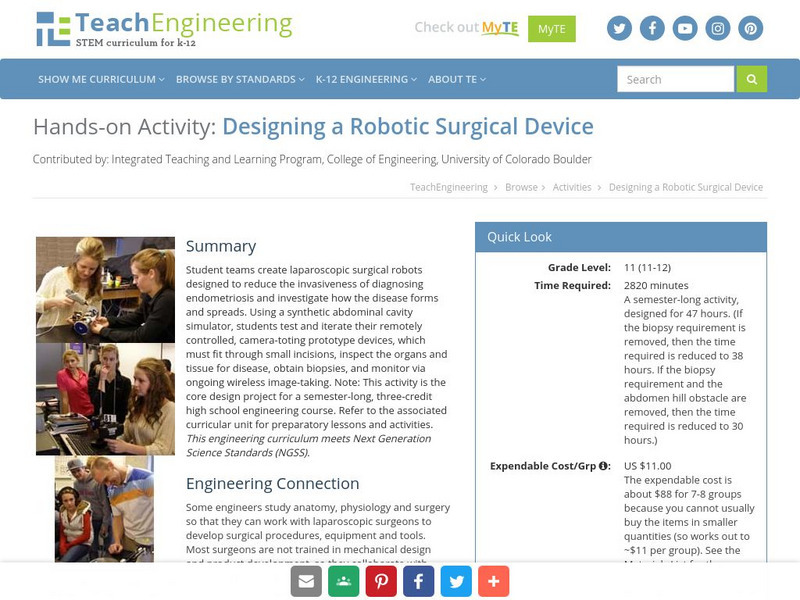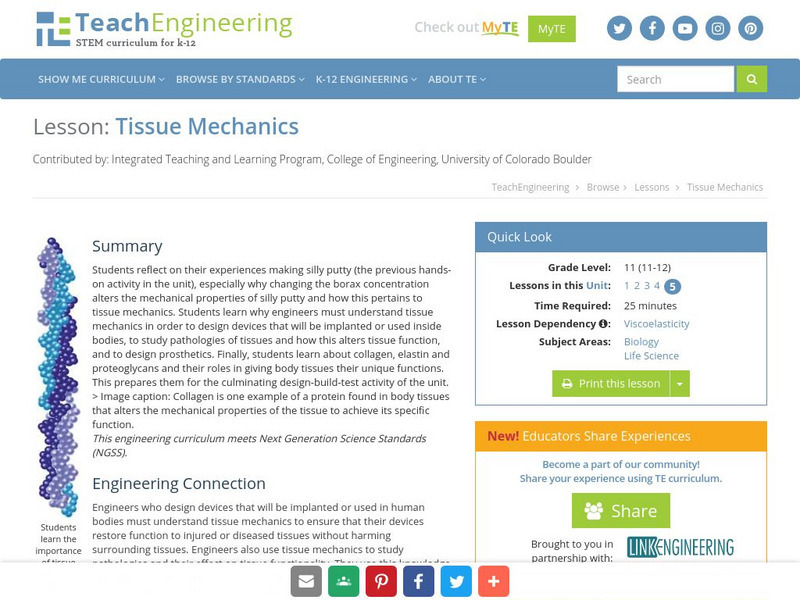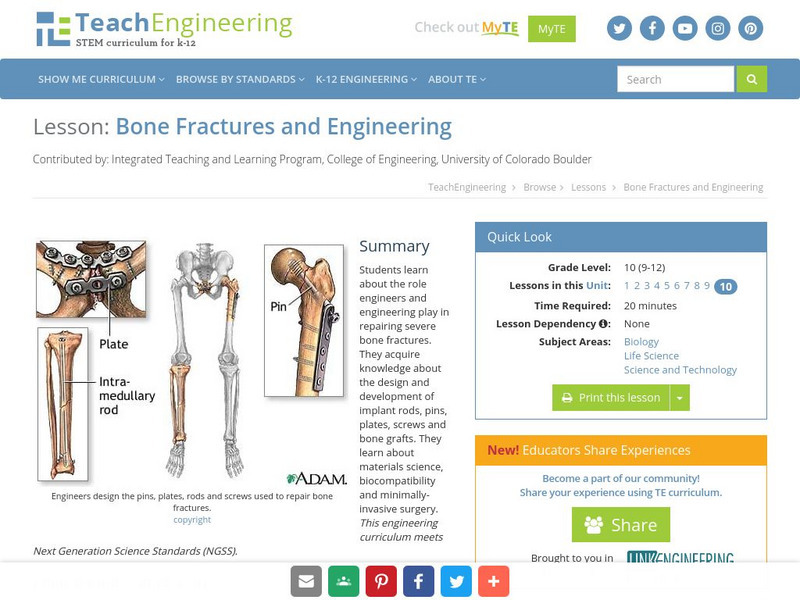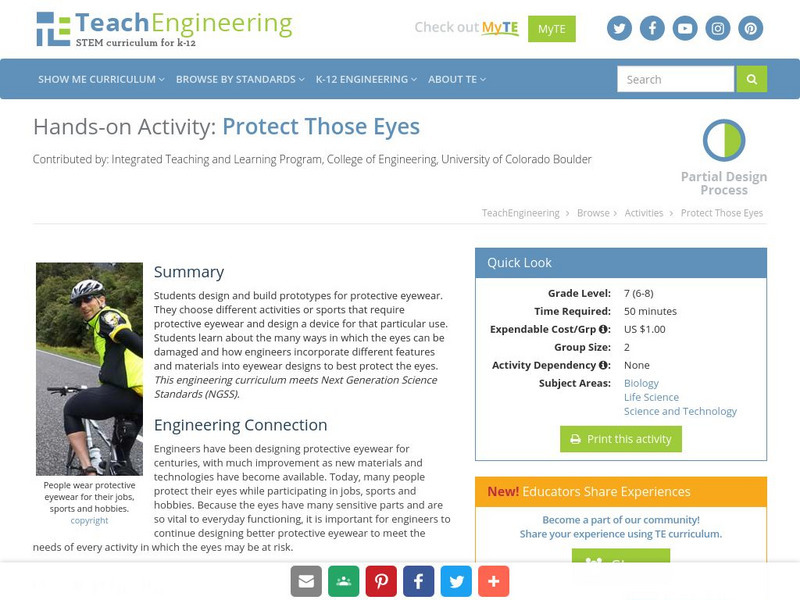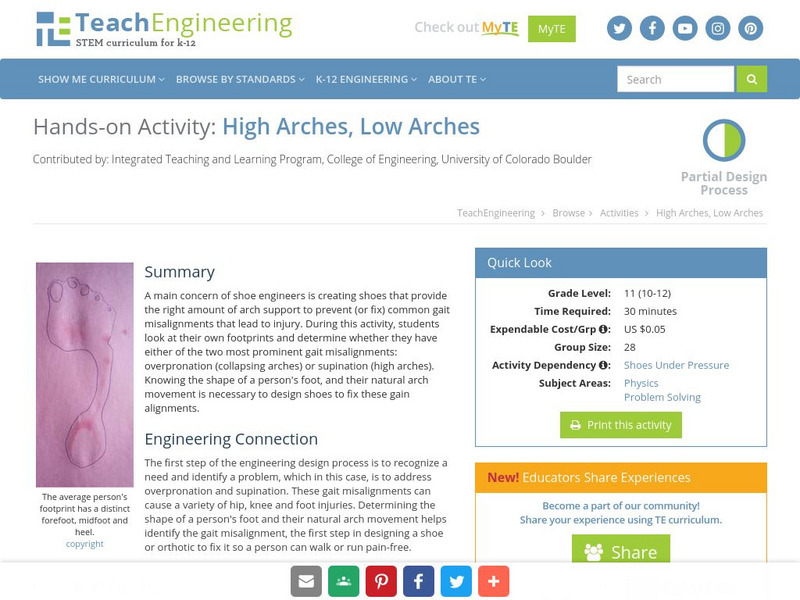TeachEngineering
Teach Engineering: No Valve in Vain
In this activity, students will design and create their own heart valves out of a variety of materials given to them, including: waterproof tape, plastic tubing, flexible plastic sheets, foam sheets, scissors, clay, etc. This activity...
TeachEngineering
Teach Engineering: Design a Bicycle Helmet
The goal of the activities is for students to understand the basics of engineering associated with safety products. Using a bicycle helmet helps to protect the brain and neck during a crash. In order to do this effectively, helmets must...
TeachEngineering
Teach Engineering: Engineer a Sneaker
The goal is for students to understand the basics of engineering that go into the design of a sneaker. The bottom or sole of a sneaker provides support, cushioning, and traction. In addition the sole is flexible and can have some fashion...
TeachEngineering
Teach Engineering: Bone Crusher
Students use a tension-compression machine or an alternative bone-breaking setup to see how different bones fracture differently and with different amounts of force, depending on their body locations. Teams determine bone mass and...
TeachEngineering
Teach Engineering: Show Me the Genes
In this activity, students create posters which explain and illustrate thin film refraction and the factors that influence it. The goal is to explain the experimental results of using an optical biosensor, and prove these results with a...
TeachEngineering
Teach Engineering: The Grand Challenge: Fix the Hip Challenge
This lesson introduces the Bone Module Grand Challenge question. Students are asked to write their initial responses to the question alone. They will then brainstorm ideas with one other student. Finally, the ideas are shared with the...
TeachEngineering
Teach Engineering: Living With Your Liver
Students learn the function of the liver and how biomedical engineers can use liver regeneration to help people. Students test the effects of chemical toxins on a beef liver and how salt changes the liver's ability to break down these...
TeachEngineering
Teach Engineering: Forced to Fracture
Students learn how forces affect the human skeletal system through fractures, and why certain bones are more likely to break than others depending on their design and use in the body. They learn how engineers and doctors collaborate to...
TeachEngineering
Teach Engineering: Watch Out for the Blind Spots
In this service-learning engineering project, students follow the steps of the engineering design process to design a hearing testing device. More specifically, they design a prototype machine that can be used to test the peripheral...
TeachEngineering
Teach Engineering: Using Stress and Strain to Detect Cancer
In this project, students are challenged to answer the question "Is there a way to detect the presence of tumors that isn't as painful as mammography but more reliable and quantifiable than a breast-self exam or clinical breast-exams?"....
TeachEngineering
Teach Engineering: Preconditioning Balloons
Students use balloons (a polymer) to explore preconditioning a viscoelastic material behavior that is important to understand when designing biomedical devices. They improve their understanding of preconditioning by measuring the force...
TeachEngineering
Teach Engineering: Designing a Robotic Surgical Device
Student teams create laparoscopic surgical robots designed to reduce the invasiveness of diagnosing endometriosis and investigate how the disease forms and spreads. Using a synthetic abdominal cavity simulator, students test and iterate...
TeachEngineering
Teach Engineering: Next Generation Surgical Tools in the Body
Through this unit, students act as engineers who are given the challenge to design laparoscopic surgical tools. After learning about human anatomy and physiology of the abdominopelvic cavity, especially as it applies to laparoscopic...
TeachEngineering
Teach Engineering: Tissue Mechanics
Students reflect on their experiences making silly putty (the previous hands-on activity in the unit), especially why changing the borax concentration alters the mechanical properties of silly putty and how this pertains to tissue...
TeachEngineering
Teach Engineering: Engineering and the Human Body
The Engineering and the Human Body unit covers the broad spectrum of topics that make up our very amazing human body. Students are introduced to the space environment and learn the major differences between the environment on Earth and...
TeachEngineering
Teach Engineering: Waves: The Three Color Mystery
Students are presented with a challenge question concerning color blindness and asked to use engineering principles to design devices to help people who are color blind. Using the legacy cycle as a model, this unit is comprised of five...
TeachEngineering
Teach Engineering: Bone Fractures and Engineering
Students learn about the role engineers and engineering play in repairing severe bone fractures. They acquire knowledge about the design and development of implant rods, pins, plates, screws and bone grafts. They learn about materials...
TeachEngineering
Teach Engineering: Abdominal Cavity and Laparoscopic Surgery
For students interested in studying biomechanical engineering, especially in the field of surgery, this lesson serves as an anatomy and physiology primer of the abdominopelvic cavity. Students are introduced to the abdominopelvic...
TeachEngineering
Teach Engineering: Protect Those Eyes
Students design and build prototypes for protective eyewear. They choose different activities or sports that require protective eyewear and design a device for that particular use. Students learn about the many ways in which the eyes can...
TeachEngineering
Teach Engineering: Glowing Flowers
Student teams learn about engineering design of green fluorescent proteins (GFPs) and their use in medical research, including stem cell research. They simulate the use of GFPs by adding fluorescent dye to water and letting a flower or...
TeachEngineering
Teach Engineering: High Arches, Low Arches
A main concern of shoe engineers is creating shoes that provide the right amount of arch support to prevent (or fix) common gait misalignments that lead to injury. During this activity, students look at their own footprints and determine...
TeachEngineering
Teach Engineering: Nano Tech: Insights Into a Nano Sized World
Through two lessons and four activities, students learn about nanotechnology, its extreme smallness, and its vast and growing applications in our world. Embedded within the unit is a broader introduction to the field of material science...
TeachEngineering
Teach Engineering: Muscles, Oh My!
Students are introduced to how engineering closely relates to the field of biomechanics and how the muscular system produces human movement. They learn the importance of the muscular system in our daily lives, why it is important to be...
TeachEngineering
Teach Engineering: Viscoelasticity
Students are introduced to the concept of viscoelasticity and some of the material behaviors of viscoelastic materials, including strain rate dependence, stress relaxation, creep, hysteresis and preconditioning. Viscoelastic material...
